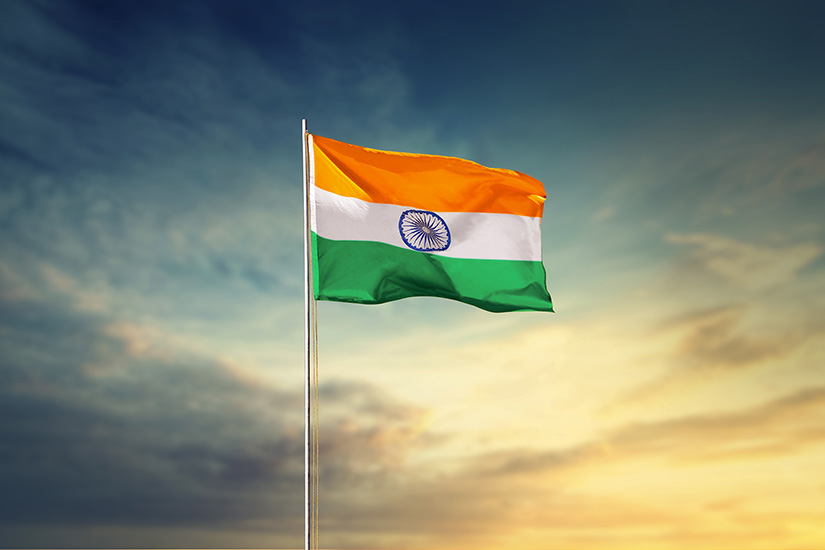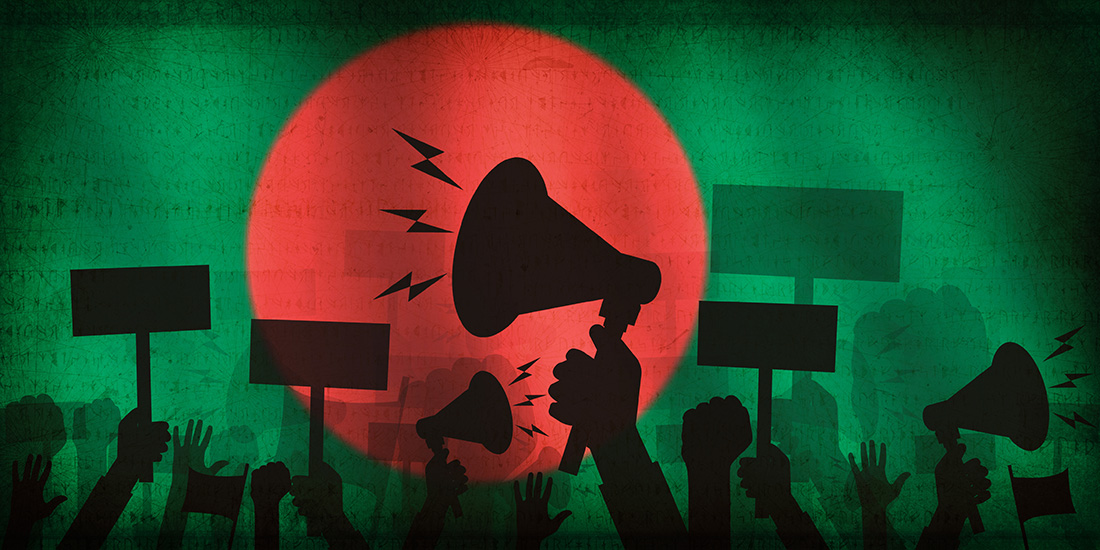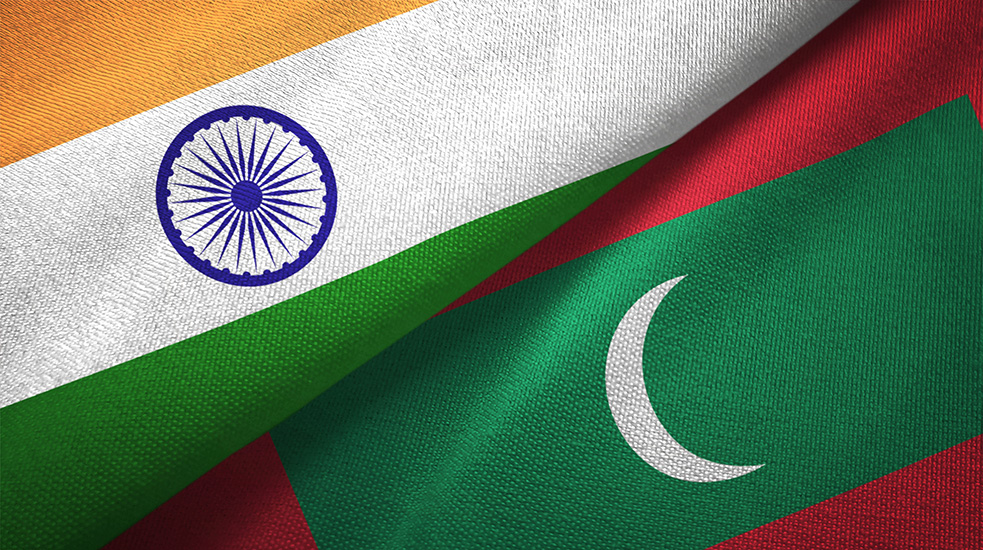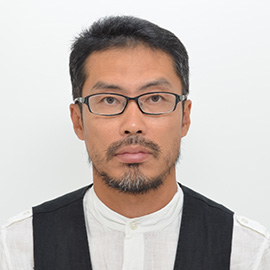It is still fresh in our minds that in the fall of 2023, the pro-India incumbent Solih lost the presidential election in the Maldives to Muizzu, who had an "India Out" policy [1]. Two important "pro-India" regimes in Bangladesh and Sri Lanka, which were barely holding on in South Asia, have now fallen one after the other, and the shock is spreading in India.

Bangladesh Swallowed by a Wave of "Student Revolution”
The political upheaval in Bangladesh, among other countries, has completely blindsided India. The Awami League (AL) government led by Prime Minister Hasina, which had been in power continuously since the general election at the end of 2008, had just begun a rare fourth term after winning the January 2024 general election. AL is an old political party that led Bangladesh's independence from Pakistan and was originally secularist and pro-India in nature, partly because of the support it received from India at the time of independence. In contrast, the Bangladesh Nationalist Party (BNP), which was formed later, has a stronger Islamic identity and tends to emphasize relations with Pakistan and China. Hence, the 15-year long existence of the Hasina government was supposed to make Bangladesh a stable neighbor partner alongside Bhutan from India's point of view, while pro-China regimes were frequently formed in Nepal, Sri Lanka, and the Maldives.
Such optimism, however, has come with pitfalls. In contrast to the pro-India Hasina government, India's former Congress Party coalition government under Manmohan Singh and Modi’s Bharatiya Janata Party (BJP - ‘India People’s Party’) government have both continued to put off Bangladesh's longstanding request for a joint river management and utilization agreement in the face of opposition from neighboring states [2]. The BNP and other opposition parties naturally criticized the pro-India line of the Hasina government for its lack of results, but the Hasina government used strong-arm tactics to shut down dissent. It has also maintained its power by imprisoning BNP officials, including former Prime Minister Zia, and by refusing to appoint a caretaker government to manage the election, as is customary leading up to elections, excluding opposition parties from the electoral process. While the U.S. and Europe have criticized the elections as "undemocratic" and refused to even recognize their legitimacy, India has fully supported the "pro-Indian" Hasina government [3].
However, there has been a backlash among the Bangladeshi people against the authoritarian Hasina government. India seems to have underestimated or not even grasped such signs in its neighbor in the first place [4].
It was the High Court's decision on the civil service recruitment quota that set off anger among the Bangladeshi people. The preferential quota, which in effect leads to preferential treatment for AL officials and supporters, had once been abolished, but when the high court ruled in June that it should be reinstated, students who were already having difficulty finding jobs began a protest movement. The anger reached its peak when Prime Minister Sheikh Hasina dismissed these opposition students as "Razakars," meaning traitors who sided with Pakistan during the War of Independence. The fact that many were killed in clashes with the police also led to further student protest. With students closing in on the presidential residence in the capital, Dhaka, and a request to mobilize the military denied, Hasina made a hasty escape by helicopter and transport plane to neighboring India on August 5.
The sudden end of the "pro-Indian" government, which India had long believed to be stable, led to dismay in Indian government and society that could not be hidden. Social networking sites were flooded with rumors about attacks on minorities in Bangladesh, especially Hindus, as well as conspiracy theories that Hasina's resignation was brought about by the U.S. or even by China and Pakistan. The major media outlets also reported on these rumors without confirming their authenticity [5]. Minister of External Affairs Jaishankar, Prime Minister Modi and other government officials have urged the interim government, led by Nobel Peace Prize Laureate Muhammad Yunus, who was nominated by the students on August 9, to ensure the safety of Hindus, but Bangladesh has refuted the rumors and statements circulating in India as exaggerated and untrue [6].
The anti-Hasina atmosphere that ultimately came to the surface in Bangladesh has led to an outpouring of hatred against India, the great power that supported and even now shelters the dictator [7]. The disinformation and conspiracy theories spread in Indian society have further amplified distrust towards the country [8].

Sri Lanka Rejects Austerity and Old-Style Politics
Although to some extent expected compared to Bangladesh, the September 2024 presidential election in Sri Lanka resulted in the incumbent President Wickremesinghe losing office. Wickremesinghe, who became president in a dramatic political coup in 2022 intending to rebuild an economy ruined by massive debts and the profligate spending by the Rajapaksa family, who were known for being “pro-China,” [9] negotiated with creditor countries, including Japan and India, to obtain a loan from the International Monetary Fund (IMF). However, the public were strongly dissatisfied with the austerity measures that had been forced upon them, and from the outset it was thought that reelection would not be an easy task. That is why India's National Security Advisor Doval, who visited Sri Lanka in the lead up to the elections, met with all the leading candidates, not just the incumbent [10].
Still, some in India believed that Premadasa, who, like Wickremesinghe, comes from a pro-India United National Party (UNP) background, was a strong contender. However, when push came to shove, these expectations proved unfounded. The new president, who won more votes than Premadasa, was Dissanayake, a left-wing leader not associated with the two major parties that have dominated Sri Lankan politics to date. Concerns have spread that Dissanayake’s Janatha Vimukthi Peramuna (JVP - “People’s Liberation Front”), having once agitated for majority ethnic Sinhala nationalism, and having refused to reconcile with the Tamils who have ties to India, and having even staged an armed rebellion against the deployment of Indian peacekeepers, may prove be "anti-India," while his Marxist beliefs may lead him to be "pro-China” [11].
Nevertheless, the choice of Dissanayake over Wickremesinghe or Premadasa was not because the citizens wanted a return to the "anti-India, pro-China" line of the Rajapaksa era that contributed to the financial collapse. As Sri Lankan political scientists have pointed out, the result is a continuation to the political upheaval of two years ago and should be seen as a revolt by citizens fed up with the old-style elite politics [12]. In fact, while it is true that, since the election campaign, Dissanayake has been advocating for, among other things, the reconsideration of the power projects by Adani Group, a company close to the Modi administration in India, he has never denied the importance of relations with India, and, unlike in Bangladesh, there is no "anti-India" mood spreading throughout society.
Indian Pragmatism and the Nationalism That Hinders it
India's response to political change in neighboring countries has differed in Bangladesh and Sri Lanka. With Bangladesh, India has long relied on its relationship only with Hasina's AL and has been hostile to all other forces, including the BNP, for their Islamism [13]. For that reason, the unexpected downfall of Hasina has caused panic and led to baseless conspiracy theories, and even the ruling party has repeatedly made statements that exaggerate the plight of the Hindu people, juxtaposing them with the Rohingya and raising panic about an invasion of Bangladeshi people over the border. Of course, the Bangladeshi side have strongly protested this [14].
This could drive Bangladesh to the side of Pakistan and China. Minister of External Affairs Jaishankar and other professionals in Indian diplomacy are well aware of this situation. The Indian Ambassador to Bangladesh initiated contacts not only with the interim government but also with BNP officials [15] and took the opportunity offered by the UN General Assembly in New York to have a meeting of foreign ministers [16], which we can credit as pragmatic diplomacy that faces up to a post-Hasina reality. The problem is that the nationalism of the Hindu majority in India, which the Modi administration has itself fanned, gets in the way of pursuing such pragmatic diplomacy [17].
In this sense, India has so far been calm and pragmatic in dealing with the change of government in Sri Lanka from Wickremesinghe to Dissanayake. In fact, India understood ahead of time that Dissanayake was reasonably popular, and Minister of External Affairs Jaishankar accepted a meeting with him in Delhi in February 2024 [18]. In other words, unlike in Bangladesh, India made contacts with actors outside the regime early on. The Minister of External Affairs was one of the first to visit Sri Lanka after Dissanayake's inauguration, promising "full support" for the country’s economic recovery and growth, and paving the way for the President to choose India as his first destination for an overseas visit [19].
In Sri Lanka, nationalism has been moderated and pragmatism has been achieved to some extent because India prepared for developments that were within its expectations, and because Dissanayake himself has advocated ethnic reconciliation, even though he did not win many votes in the Tamil areas.
Already in the Maldives, from India’s perspective, we can see the germs of a policy of intervening to at least prevent the emergence of “anti-India” politics, even in governments that at heart are unfriendly. India, which had been temporarily enraged by the slogans used in President Muizzu's election campaign, later demonstrated a "mature response" by agreeing to Muizzu's demands and withdrawing its troops from the country, deciding to continue allowing the Maldives to export rice and wheat, which had been restricted, and even inviting Muizzu to attend Modi's inauguration ceremony after the Indian general elections. In this context, the Muizzu's administration has begun to drop its "anti-India and pro-China" banner and develop a more balanced diplomacy, as China, wary of the Maldives' massive external debt, has begun to be more cautious about further loans [20]. Following the visits of several ministers to India, Muizzu himself finally visited India for bilateral talks in October 2024. In response, the Indian side responded by concluding a currency swap agreement worth $750 million[21].
As the competition with China for influence in the region intensifies, it remains to be seen whether India will be able to carry out the same pragmatic diplomacy with post-Hasina Bangladesh.

(2024/11/12)
Notes
- 1 Toru Ito, "The South Asian Situation and India in 'Election Year'," International Information Network Analysis IINA, February 27, 2024.
- 2 For more information, see Toru Ito, The Behavioral Principles of India as an Emerging Superpower, Keio University Press, 2020, pp. 98-105.
- 3 Regarding the 2024 general election, the U.S. State Department expressed concern about arrests of opposition leaders and irregularities in the election process, and made the criticism that this election, in which the opposition did not participate, was not free and fair.U.S. Department of State, "Parliamentary Elections in Bangladesh," January 7, 2024.; In contrast, Prime Minister Modi immediately congratulated Prime Minister Hasina for "a successful election."Rezaul H Laskar, "'People-centric partnership': PM Modi congratulates Sheikh Hasina on re-election ," Hindustan Times, January 8, 2024.
- 4 According to the head of a leading Bangladeshi think tank, they have been attempting to convey to India Hasina's declining popularity and the dangers of relying on her, but the Indian side has been unwilling to understand the situation. Kallol Bhattacherjee, “India must engage with all sides in Bangladesh: Top policy analyst,” The Hindu, September 1, 2024.
- 5 "Western plot against Sheikh Hasina? What she revealed in May," The Economic Times, August 5, 2024.
- 6 Kallol Bhattacherjee, "PM Modi speaks to Yunus, calls for safety of Hindus in Bangladesh," The Hindu August 16, 2024.
- 7 Some believe that Hasina has since left India and may be hiding in a third country, such as the UAE, but details of her whereabouts are not known. "Hasina's whereabouts not confirmed: Foreign Adviser," BSS News, October 8, 2024.
- 8 Ahmede Hussain, "India's 'Sheikh Hasina Problem' is Not Going Away Easily," The Wire, August 25, 2024.
- 9 Toru Ito, "India and China's Struggle for Influence over Shaky Sri Lanka: Can the Quad Play a Role?" International Information Network Analysis IINA, August 19, 2022.
- 10 Meera Srinivasan, "NSA Doval meets key Presidential aspirants in Colombo ahead of Sri Lanka's September 21 polls ," The Hindu, August 30, 2024.
- 11 Gulam Jeelani, "Leftist, pro-China Anura Dissanayake is new President of Sri Lanka. What it means for India. Explained in 5 points Explained in 5 points," Mint, September 23, 2024.
- 12 Jayadeva Uyangoda, "A break from the past, a new beginning in Sri Lanka," The Hindu, September 25.
- 13 Bangladesh's interim prime minister, in an interview with the Indian PTI news agency, urged India to move past the narrative that all parties outside of AL are Islamists and that without Hasina the country would become like Afghanistan."Hasina must stay silent in India till Bangladesh seeks her extradition: Yunus, The Daily Star, September 5, 2024.
- 14 "Dhaka strongly protests against Amit Shah's remarks on 'Bangladeshi infiltrators' ," The Indian Express, September 24, 2024.
- 15 Kallol Bhattacherjee, "India reaches out to Bangladesh opposition BNP, envoy meets party leader," The Hindu, September 22 2024.
- 16 "In a First Since Sheikh Hasina's Ouster, India and Bangladesh Foreign Ministers Meet," The Wire, September 24, 2024.
- 17 Toru Ito, "Indian Diplomacy at a Crossroads: An Evaluation of the Last Decade under the Modi Administration and the Challenges Ahead,” International Affairs, No. 718, April 2024.
- 18 Meera Srinivasan, "Sri Lankan Opposition JVP leader meets Jaishankar, Doval," The Hindu, February 6, 2024.
- 19 Meera Srinivasan, "Jaishankar meets President Dissanayake, reaffirms India's 'full support' in Sri Lanka's economic recovery," The Hindu, October 4, 2024.
- 20 Harsh V. Pant and Aditya Gowdara Shivamurthy, "From China Tilt to a Balancing with Beijing and Delhi," The Hindu, June 25, 2024.
- 21 Suhasini Haidar, "India Gives Maldives a $750 Million Currency Swap Arrangement," The Hindu, October 9, 2024.

